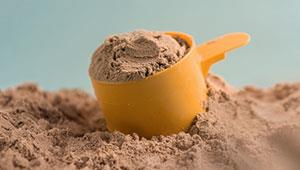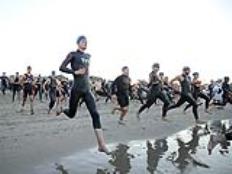White remembers his first triathlon swim clearly. He says the performance wasn't bad, considering that prior to that race he had "absolutely no swimming resume, couldn't swim more than 100 meters without resting and had the streamline profile of a river barge." He says that after his experience, he joined a triathlon swim training group and his swimming technique and outlook changed. His decision to focus on stroke technique changed the course of his triathlon career. A coach who understands triathletes and their needs to get your technique analyzed can help you become a more efficient swimmer.
Practice
Many swimmers face anxiety in the open water simply because they haven't familiarized themselves with race-day conditions. Swimming in a clear, calm pool with a lane all to yourself is a far cry from the open water, where crowds, choppy conditions or extreme cold can lead to disorientation and subsequent panic attacks. In order to minimize the discomfort you will be feeling during the swim, you need to prepare for the potential scenarios you'll face by practicing, both in the pool and in the open water.
Reasons to Go Long In the Pool
In preparing for his marathon swim around Key West, White followed a training plan that allowed him to increase his endurance, acclimate to the warm temperatures he'd face during the swim and practice implementing his nutrition plan. Although IRONMAN races do not feature marathon swims, your training plan should incorporate many of the same elements, with training completed both in the pool and in the open water.
In addition to developing efficient technique, your pool training should include strength and endurance work using a combination of drill and interval-based swim sets to diminish both strength and skill-related anxiety potential on race day. Practice swimming the distance you will be completing during the race and incorporate longer swimming sets into your workouts. Implement drills that are targeted at fine-tuning open water skills, such as turns, sighting and drafting. If you're able to swim with a group, try removing the lane lines and swimming together to at least partially simulate the jostling conditions you will face during the swim. The pool serves as an excellent home-base for specific training, so be sure to spend some time there even if you have access to open water year-round.
More: 6 Tips for Beginning Open Water Swimmers
You'll also need to spend time in the setting that is most relevant to your race day swim: the open water. Safety should be your number one priority, so be sure to never swim alone. Join a training group or register for open water clinics that will allow you to acclimate to the open water in a secure setting. You can often practice swimming the race course before the event, so be sure to take advantage of the opportunity to test it out.
Mental Preparation
You've put in the time and trained smart. What's next? Believe it or not, there's more to swimming than just the physical effort. Another key to reducing open water anxiety is mental preparation, which can help you remain relaxed in otherwise stressful situations. Two of the most important concepts to practice are pre-race routines and cognitive control.
More: 6 Swim Sets That Build Endurance
As sports psychologist Dr. Jennifer Lager writes in a recent article, "Having a pre-race routine is an important tool to cope with the nerves that are so common for swimmers." Your pre-race routine should include external preparation, such as eating a certain meal, or testing your goggles and wetsuit and internal preparation, which includes visualizing your race and picturing how you will deal with the various scenarios that might arise. Visualizing what steps you will take if you get kicked, lose your goggles, or start to fatigue will help increase your confidence and assuage some of the inevitable pre-race nerves.
Practicing cognitive control is another important part of the mental preparation that goes into any open water swim. Cognitive control is the regulation of our thought processes and the amount of control that we have can be strengthened through mindfulness exercises. Being in the 'here and now" through mindfulness allows us to become more aware of how we are thinking and feeling. This in turn helps reduce other distractions and thus diminish stress levels, an extremely important tool to use during an open water race when experiencing situations beyond our control. During his swim around Key West, White practiced staying in the moment rather than letting his thoughts wander, which allowed him to remain focused and methodical during his swim.
There are many different strategies to help reduce your anxiety in the open water, and the steps we have outlined are just a few of the possibilities. Work with a coach to develop a training plan that includes physical and mental preparation and you will feel confident and prepared for anything during your race-day swim.
More: 50 Things Open Water Swimmers Shouldn't Do
 Sign up for an IRONMAN.
Sign up for an IRONMAN.
- 2
- of
- 2
About the Author









Discuss This Article